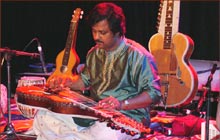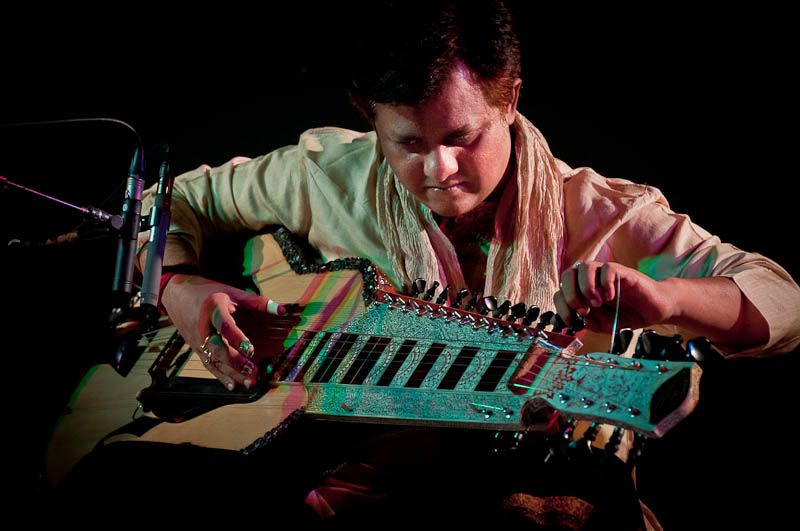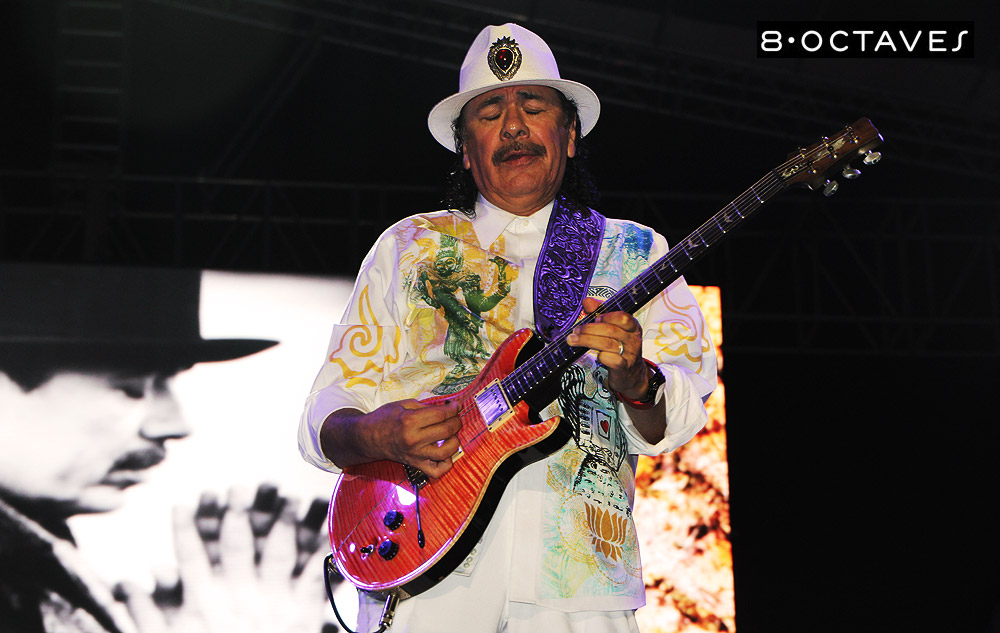Born into one of the most respected musical families in Kolkata, Pandit Debashish Bhattacharya started his journey with music at a very young age. He picked up the Guitar at the tender age of 3 and made his debut on All India Radio at the age of 4. Trained under the guidance of the legendary Indian Slide Guitarist – Pandit Brij Bhushan Kabra, Pandit Debashish Bhattacharya is regarded as the pioneer of Indian Classical music on the Slide Guitar. With a career spanning over 40 years and still going strong, we caught up with the legendary Grammy nominated musician to uncover some secrets about his illustrious career and his life:-
Eight Octaves: Tell us about your early days. How did you get into Hindustani Classical music?
Debashish Bhattacharya: I belong to a family of roughly 72 generation of musicians, litterateurs, writers and preachers of the Bhattacharya legacy started in Etawa in 15th century and living in Banga (undivided Bengal) since 18th Century. My parents are singers, so were my grandparents. I did not try my luck in music. I heard music since the first life was planted in my mother’s womb. I’ve been very lucky to be in the daily act and practice of music every evening since birth and till I started music professionally, it was the only inspiration. My music has been lucky because of expression of melody and rhythm, as well as literature and colours were the only belongings since I grew up.
Eight Octaves: Playing the genre on a Slide Guitar isn’t easy at all, how difficult was it to master the art? What changes did you have to make in the traditional techniques of playing a Slide Guitar to incorporate the Hindustani Classical style?
Debashish Bhattacharya: Slide guitar – name was known in India only after my first video which was released in 1994 as Hindustani Slide Guitar, people in India knew it before as the Hawaiian Guitar, but often misspelt as Hawain Guitar and played Robindro Shongeet and other slow moving composed contemporary songs… 😀
I played that instrument without knowing its history origin technique by myself since age of three, without knowing who the players are. In the year 1966 there were no apps, internet, cd, computer or mobile phones. In 1969 and 1970, I studied Western staff notations and finger picking style in Kolkata
Rest whatever you see me and my playing style, creations of instrument and music, I did with my guitar. It is like – all of us breathe in and out silently and it works on our body day and night, I still do it through my understanding and living in music only because it is beyond and bigger than my love and passion. IT IS ME! Debashish! I simply do not do anything else… Don’t take me wrong I’m not Arrogant!!
Right hand finger technique, combinations of finger picking, arrangement of strings, tuning of guitars, holding of bar, movement of the bar, right hand-left hand sync, introducing drone and rhythm strings on guitar – these are the facts that has been archived in numerous universities, faculties around the world, and I feel good to see there are thousands of slide guitarists and institutions, who got inspired by my style and technique. That is what I wanted to plant in the world of Guitar. You may wonder why I’m saying this. It’s because I’ve started it so early. When in India people used to play only first two strings, and mostly all their life they played with one fixed tuning; during 1975- 1978 I introduced eight different tunings which no one even realized at that time, but there are much more which can’t be written in words. You need to eat Mangoes to taste it.
I’m lucky being chosen to change the definition status, content of music. Subject of Hawain Guitar to Indian slide Guitar to Hindustani Slide Guitar to Chaturangui, Gandharvi, Debangui, Anandi and so on. Also being a performing musician, composer, recording artiste, collaborator I never left behind my responsibility towards my each creation of Raga and Guitar, not even today…during even giving you interview J

Eight Octaves: Who would be your biggest influences in music and in life?
Debashish Bhattacharya: After my saint parents? Only a few – Baba Allauddin Khan, Ustad Ali Akbar Khan in my childhood, Rabindranath Thakur and Thakur Ramakrishna and Swami Vivekananda in my early youth.
Albert Einstein, Miles Davis, P.B. Shelly, Byron, Keats, Bankim Chandra, Sharat Babu, Nazrul, Lata Mangeshkar, Ustad Bade Ghulam Ali Khan, Mozart, Beethoven , Bach, Paintings of European and Indian classical style, studies of Geography Political science during my college.
In other hand, I grew up with Sonar Bangla, Shyama Maa ki amar Kalo re? and the Manna Dey, Sandhya Mukherjee, Manabendra, Shyamal, Pratima, Rafi, Kishore Hemanta, Salil Chowdhury, Suchitra Uttam, Bhanu Banerjee and so on..kake bad debo? (Whom can I ignore from the list?). I realized so many little things from all the art forms classical, contemporary, serious and funny, comedy, joy and happy moods, they added in my music like molecules one after another when I’m awake or sleeping, like rejuvenating my cells within myself. See you can’t take this for granted!! Wisdom comes from knowledge, knowledge is only logic. When logic respects emotion, they together enrich spirituality; it is a constant practice which I’ve imbibed from my parents. It’s not easy!
Eight Octaves: Now coming to your playing style, you have a unique style of playing the slide guitar – using your thumb and index finger. It can be sort of compared with alternate picking style on the Spanish guitar, or similar stringed instruments. Was this an outcome of trying to play the Slide Guitar in Indian Classical style?
Debashish Bhattacharya: I use three fingers, and now learning how to use others too! Alternate picking in Spanish, Mandolin, Saaz, Oud, Rabab is different than Sarod and Sitar, mine is a combination of ( as of now-it changes) Veena, Taar, Sarod and Banjo. But don’t get me wrong, people found this finger picking similarity during 1978 and started comparing it; I had no Youtube to get information and copy. I’ve created it without knowing they exist: the style came out from within when I was only 7 years old!
Eight Octaves: Shed some light on your trademark – Trinity of Guitars. How did you get the idea to create something like that?
Debashish Bhattacharya: Shiva, Parvati and Ganesha are the Trinetra or Trinayan. The Word Trinity has been adapted from this Sanskrit word. Chaturangui is Male, Gandharvi is female, Anandi is the child.
All guitars are Patented and licensed to Trideb International Guitar Co., to save the creation and also to save lives of the makers.
Eight Octaves: The name of the three guitars – Anandi, Chaturangui and Gandharvi; have a connection with Hindu mythology. Was there any reason behind the naming of the instruments?
Debashish Bhattacharya: Yes, because I am Bharatiya. “Sanaatan Dharma”, not Hindu. I belong to a family who comes from real tradition of old Bharatvarsh. I wanted to give the creation a Bharatiya identity as well as Sanaatan Dharma or universal identity.
Eight Octaves: What are your views on the current declining trend in listeners of Classical music in the country? Any suggestions on how to keep the rich heritage alive and spread it among the youth?
Debashish Bhattacharya: See anything that connects people is the aura, or simply the expression of the music. If music becomes a skilful presentation, the Mass will not be able to connect with the skill. Instead if the performer expresses the emotive Rasas, every human being would be able to connect, classical music – is NOT A SKILFUL PRESENTATION! Only a case of hyper cerebral activity does not stay with human mind and soul for long; whether in India or anywhere else.
That is the wrong line of Indian Classical music! There is less heart and more skill. You tell me how one who is not aware of such skills will connect. To save any art form it requires political will of the state at the highest level,
Do the policy makers in this country have ever figured out what other nations have been doing to save their classical music? We are complacent in placing the onus on one or two institutions who work for classical music in this country, without doing an impact assessment survey!!!!
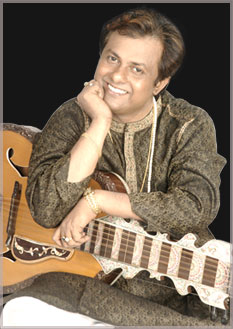
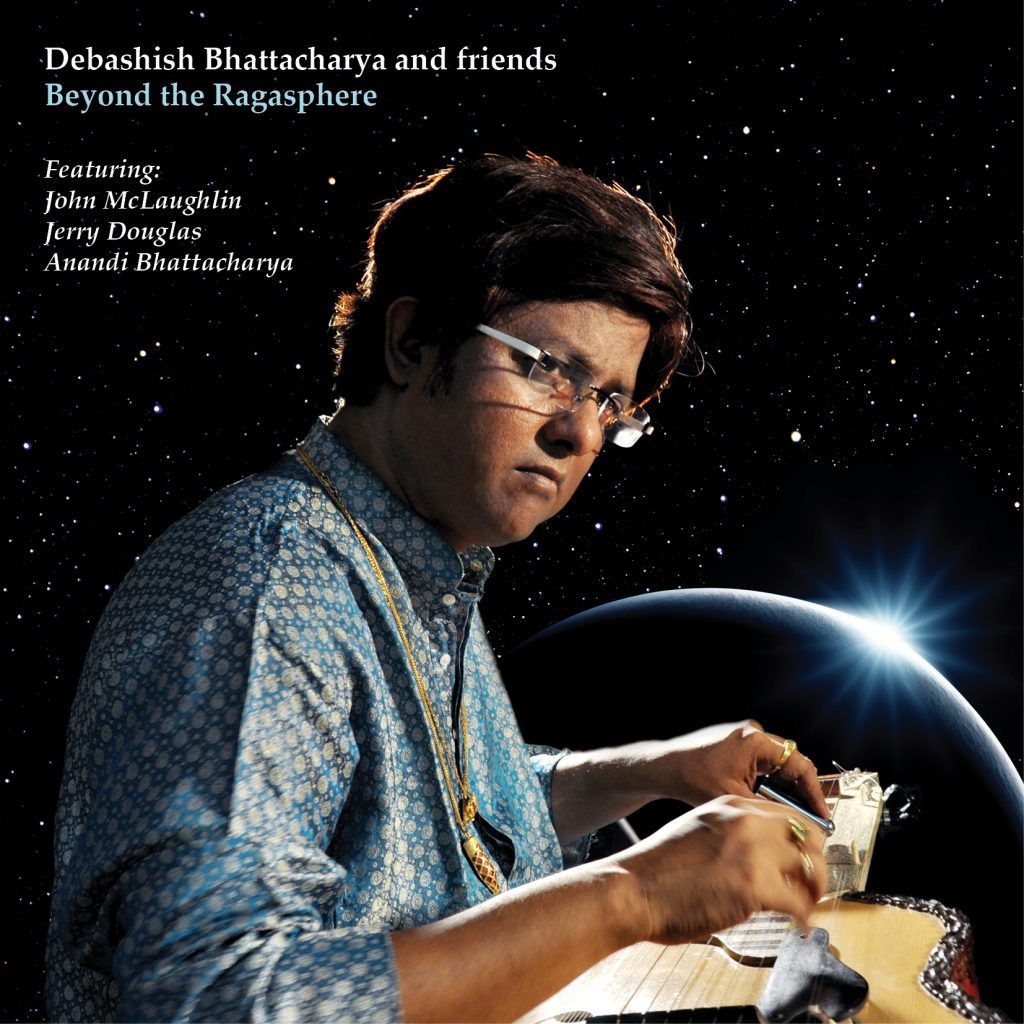
Eight Octaves: Apart from Indian Classical, do you follow any other genres of music?
Debashish Bhattacharya: I believe in the music of the world, time of the origin. Centuries taken by the music to evolve or sustain will tell you how rich it is. I enjoy any music and get inspired to listen which connects me in logic emotion and spirit. I play from Dhrupad to “Debashish”- everything with full respect and love.
Eight Octaves: You were nominated for a Grammy award in 2009. How big of an achievement was that for you?
Debashish Bhattacharya: It was great moment, but always I remember life is bigger than any such event.
Eight Octaves: You have collaborated with John Mclaughlin in Shakti. How was the experience of playing with a person of that stature?
Debashish Bhattacharya: It was really one of the greatest moments to know musicians like John and Zakirji and how they do a collaboration! I was amazed! Great experience, this reminded me, I played in John Mclaughlin’s Album – Floating Point, which was a Grammy nominated album too. My new mega album Beyond The Ragasphere (Buy/Listen here); released on 29th April from World Music Network and River Boat Records, consists one track each by of John Mclauglin, 12 times Grammy winner Jerry Douglas, Drummer Jeff Sipe and my friends from Kolkata – Bickram Ghosh and Tanmoy Bose.
Eight Octaves: All through your career you have influenced a lot of musicians to think out of the box and one can rightfully call you as one of the pioneers of Indian Classical fusion music – using Western influences and merging it with Indian music. But in terms of technicalities, how similar or different is Indian Classical from Western Classical music?
Debashish Bhattacharya: My view? Indian classical is Modal and Microtonal, expression of human moods are the most important through melodic movements, improvised more than structured, traditionally disciplined. Whereas Western classical after Mozart is equal-tempered, harmonial and mostly structured arranged and orchestrated.
Regarding me, I’m more traditional when it comes to Indian Raga music record or concert. I am very individual and try to absorb and feel the music as a new dialogue of today. When it comes to collaboration or composing, fusing the world.
Eight Octaves: When you are not on stage or when you are not doing anything related to music, how do you spend your time?
Debashish Bhattacharya: Exploring my inabilities in Painting, cooking, seeing hottest movies, or exploring talents of my own children in music, art, games. Ganga River and Maidan are my favourite place to be alone…still!
Eight Octaves: You are currently touring Europe with your group. Any other foreign tours slated for this year? Maybe a collaboration or two with some foreign artists?
Debashish Bhattacharya: I just did one project with Morocco, next is Iran, next will be Americas in September-October.
Eight Octaves: Any promising young artists in the current scene, who you think can carry forward the torch of Indian Classical music?
Debashish Bhattacharya: Many actually. Just don’t want to put any name. This interview has much information for them, believing it and being with it will help them to imbibe the real Bharat! My blessings for all.
Eight Octaves: Lastly, any words of advice for the young aspiring musicians out there?
Debashish Bhattacharya: Use music as a tool to tell who you are and what you want to say, through your performance.
